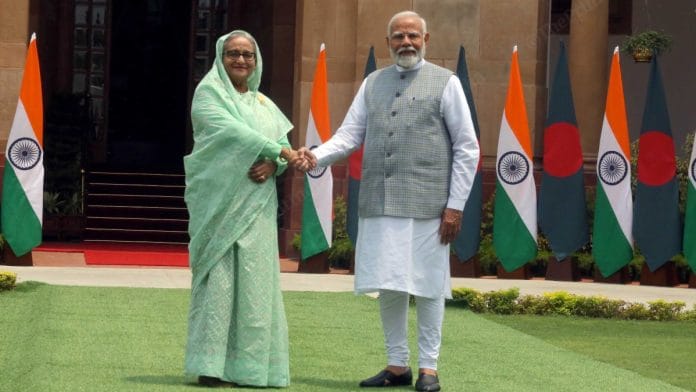New Delhi: Agreements in the domains of rail connectivity, maritime cooperation, military education, health, fisheries, a new vision for a digital partnership and green partnership were signed Saturday by New Delhi and Dhaka during Bangladesh Prime Minister Sheikh Hasina’s two-day state visit to New Delhi.
“Today we have prepared a futuristic vision for cooperation in new areas. The youth of both countries will benefit from the agreement reached on cooperation in many areas such as Green Partnership, Digital Partnership, Blue Economy, Space. India Bangladesh ‘Maitri Satellite’ will give new heights to our relations,” Prime Minister Narendra Modi said in a joint press statement with his Bangladeshi counterpart.
Eight Memorandums of Understanding (MoUs) have been signed or renewed, apart from the two new vision documents on digital and green partnerships during the current visit. Modi also announced that the two countries have agreed to commence negotiations on a comprehensive economic partnership agreement (CEPA). India also announced that it will open an Assistant High Commission in the Bangladesh city of Rangpur — its sixth mission in the country.
New Delhi also hit out at the ongoing ‘India-Out’ campaign in Bangladesh as one that is organised by an “isolated minority of vested interests” and the “figments of imagination of people”.
“Our effort in all the conversations we have with Bangladesh is on the need to work together as much as possible to essentially project the correct narrative of the relationship for the people of the two countries…it is important for people to realise such campaigns which are done by an isolated minority of vested interest are not factual. Basically the figments of imagination of people,” Foreign Secretary Vinay Kwatra said at a special media briefing Saturday.
Hasina’s visit to India is the first bilateral visit by a foreign leader since the Modi government returned to power earlier this month. It is also the Bangladeshi prime minister’s first foreign visit since the formation of the new government in Dhaka in January.
Hasina also called on President Droupadi Murmu and Vice-President Jagdeep Dhankar. External Affairs Minister S. Jaishankar met with Hasina Friday evening.
Also read: PM Modi holds bilateral talks with Bangladeshi counterpart Sheikh Hasina
Wide range of agreements signed
The new agreements include an MoU on Maritime Cooperation and Blue Economy, an MoU between In-Space and Bangladesh’s Ministry of ICT and Telecom, MoU for railway connectivity, MoU for Cooperation in Oceanography, MoU for cooperation concerning military education in the field of strategic and operational studies.
The agreements renewed were: cooperation in health and medicine, cooperation in the field of disaster management, resilience and mitigation and cooperation in fisheries.
New Delhi also announced the formation of a Joint Technical Committee for the renewal of the Ganges Water Sharing Treaty, 1996. The treaty signed between then prime minister H.D. Deve Gowda and Sheikh Hasina, has a clause which states that it will be in force for thirty years and can be renewed by mutual consent. The treaty needs to be renewed by 2026 to remain in force.
The two leaders discussed the need to enhance defence cooperation between the two countries, according to Kwatra. “They underscored the need and keenness to augment bilateral defence cooperation and to this end support plans for both modernisation of the Bangladesh Armed Forces and defence industrial cooperation between the two countries.”
The foreign secretary also highlighted that in terms of rail connectivity, a new passenger train service between Rajshahi in Bangladesh and Kolkata will be introduced, while a trial run for a goods train on Bangladesh railway till a cross-border interchange point is expected to be held sometime next month.
About 40 megawatts of power from Nepal will be soon exported to Bangladesh via the Indian grid according to Kwatra. The agreement has long been pending between the three countries. The project is a part of Kathmandu’s vision of becoming a net exporter of energy by 2025.
India will also start an electronic medical visa facility for Bangladesh citizens. According to Kwatra, around 20 to 30 percent of all visas given to Bangladeshi citizens currently are for medical purposes.
(Edited by Gitanjali Das)
Also read: In boost to cooperation, Jaishankar & Wickremesinghe commission maritime centre in Sri Lanka






